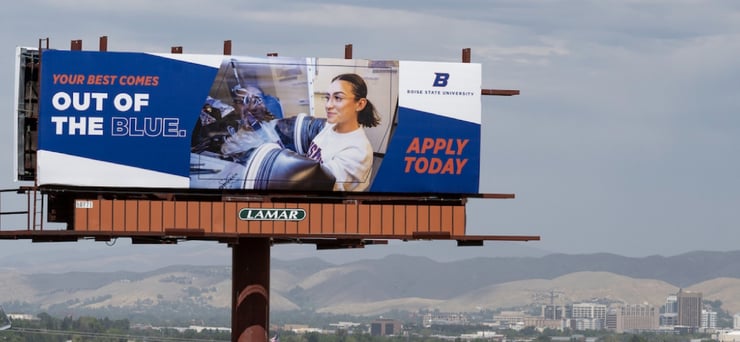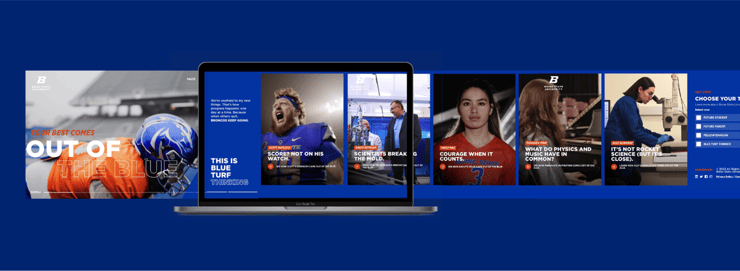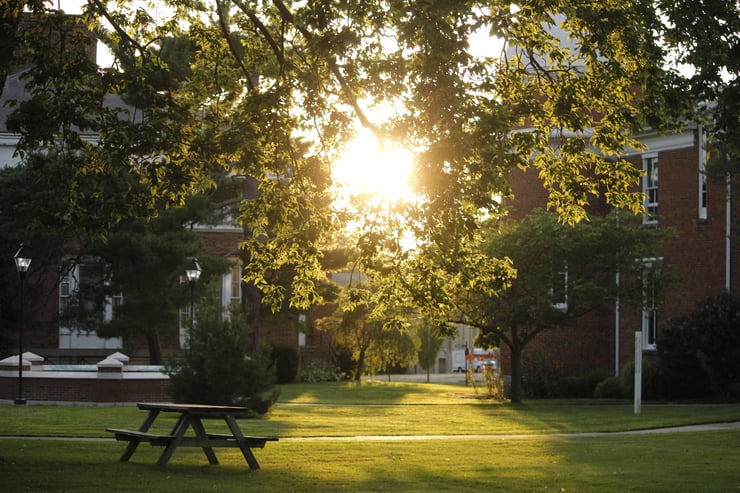There's a lot of noise right now about Artificial Intelligence and the impact it will have on society. That noise gets more signaled as you get into specific categories of impact, like marketing, business operations, health and well-being, or my personal favorite, entertainment. Earlier this month, we hosted a webinar for higher education marketers. It had about 350 registrations, which blew us away. We've hosted bigger webinars but didn't expect this topic to get so much attention.
In hindsight, it's obvious why it was so popular. Higher education has a digital transformation problem. And now is the time to get ahead.
Higher ed is an industry that has struggled to keep up with the technological advances of the last 30 years. Like the airline industry, we're slow to listen to our audiences about what they want and then advance the technology to meet them where they might be for comparable consumer experiences.
What's different about this moment compared to the past transitional moments of the digital age is that AI will be coming to college in a much more opaque manner — you won't see it like you did a new device arriving on campus. Or maybe it will just blend into the oddities of campus life.

Earlier this year, there were headlines about students using ChatGTP to cheat. The academe gasped. Then, it made rules. Then, it asked for software solutions to track down the cheaters. Then it repealed the rules. Then it doubled down on expanding the technology development. And then Harvard announced it would have AI instruction.
That whole chain of events happened in six short months!
I sat on those sidelines and chuckled at the early rejection. Roll back to word processing with spellcheck, searchable encyclopedias, or mass party invitations on Facebook. Technology continues to disrupt college administrators and faculty at Moore's Law pace.
It's not just you; these changes are coming fast.
At the annual eduWeb Summit earlier this year, SimpsonScarborough presented a session on AI. Questions from the audience pushed the session from 60 to 90 minutes. One of the most exciting questions turned the discussion away from the web and toward the day-to-day impact on student life. I think my response was something like, “Oh, it’s going to get weird.”

Most conversations about AI in higher education focus on the intellectual impact of knowledge attainment. What are the implications of augmented memory, total recall, or on-demand synthesis and authoring? Those answers are taking shape. But what about the emotional support and community aspects of a university? If you've watched Ex Machina or Her, you know where this is all going.
For some, it might be a leap to connect a prompt in the web browser to a full-blown digital partner, but it's coming. And so are virtual therapists, tutors, and advisors. Vocal coaches and athletic trainers, too.
What will this do to your on-campus staff? It will probably give them room to go deeper with students who need them most — like librarians did after Dewey jumped into the prompt and the stacks turned into book cafes.
Just wait until these artificial personas leap from the flat screen to the immersive screen to the robotic. Yes, your dorms will need room for robot companions in the same way they needed to make room for microwaves and desktop computers in the past. Will you charge an extra bed fee, or do you insist they park in the common space?
So, what's a higher education marketer to do in this emerging reality?
Start cleaning up your website content.
Ask the basic question; does this content have public value? ChatGPT, Bing, and Bard have already gobbled up your information and will share it far and wide as their answers to the most pressing questions. If that information is inaccurate or could be confused with a bloat of years' worth of the same data, you must clean it up. Move content you don't want to be part of generalized intelligence about your university to intranets. Specifically, I'm talking about the mountain of archived pages many universities have about tuition and fees from the last six years. Which one is the truth? Or how about all of those human resource manuals you have?
Plan for a website that is a differentiated experience.
Students will not surf your site for information AI can impart. Think about building memorable, smaller, more targeted experiences that convey what it's like to be a community member. Those experiences aren't just images and text made for flat screens.
Start talking to your students.
Host quarterly focus groups and ask them what they do with AI (beyond authoring their essays). Follow the trend line for the next 18 months and adapt your marketing strategies to meet them.
Embrace the emerging tools in your day-to-day marketing operation.
This industry loves the terms experiential learning — take that into your professional practice. Don't let your career go the way of the typewriter. It's an exciting time. As I have conversations around SimpsonScarborough and with our clients, those paying attention say this feels like 1999 all over again. They can see the potential of what's to come. We must experiment, dabble, and play to know where the most value will be.
And, of course, start talking with your Dean of Students about what you will do when AI leaps into humanoid form and the first student inquires, "Can I bring my robot to college?"
It's closer than you think.
__
Bob Rafferty joined SimpsonScarborough in 2019 through an acquisition of Knowble Media, where he was a founder and managing partner. He led the start-up of our Digital division and now oversees a broad range of service areas including research, strategy, creative, and digital. He also has oversight of agency operations.
To learn more about AI and its impact on higher education marketing, follow us on LinkedIn or Instagram. If you are interested in a web audit or embarking on your next redesign, consider reaching out to us. And don’t forget to explore all of SimpsonScarborough’s work, including our university website redesigns.











